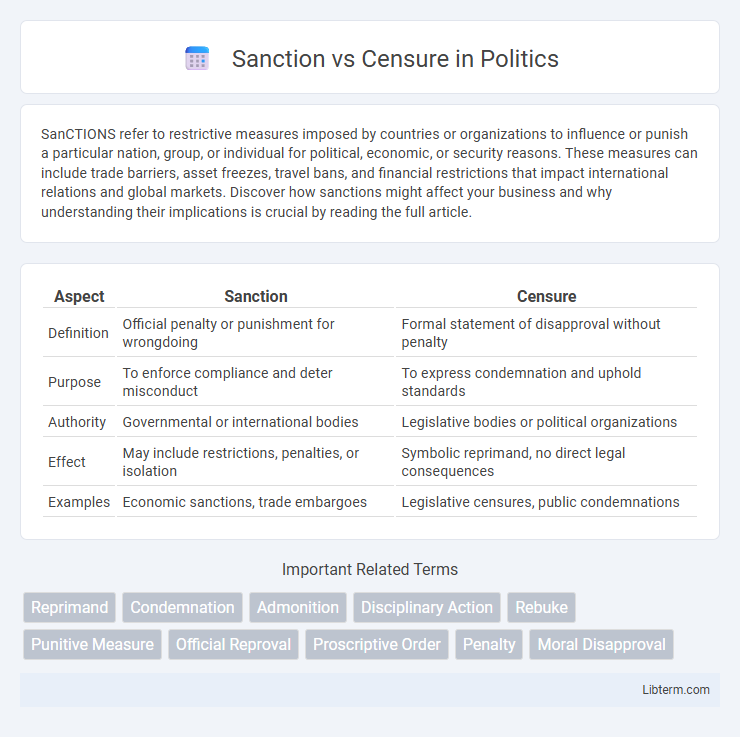SanCTIONS refer to restrictive measures imposed by countries or organizations to influence or punish a particular nation, group, or individual for political, economic, or security reasons. These measures can include trade barriers, asset freezes, travel bans, and financial restrictions that impact international relations and global markets. Discover how sanctions might affect your business and why understanding their implications is crucial by reading the full article.
Table of Comparison
| Aspect | Sanction | Censure |
|---|---|---|
| Definition | Official penalty or punishment for wrongdoing | Formal statement of disapproval without penalty |
| Purpose | To enforce compliance and deter misconduct | To express condemnation and uphold standards |
| Authority | Governmental or international bodies | Legislative bodies or political organizations |
| Effect | May include restrictions, penalties, or isolation | Symbolic reprimand, no direct legal consequences |
| Examples | Economic sanctions, trade embargoes | Legislative censures, public condemnations |
Introduction to Sanction and Censure
Sanction refers to an authoritative approval or penalty imposed to enforce compliance with laws or rules, often used in legal, political, or organizational contexts. Censure is a formal statement of disapproval issued by an official body, commonly employed in legislative or corporate settings to reprimand misconduct without imposing direct penalties. Both sanction and censure serve regulatory functions but differ in their enforcement mechanisms and severity of consequences.
Defining Sanction: Concepts and Contexts
Sanction refers to an authoritative approval or penalty imposed to enforce compliance with laws, rules, or standards across various contexts such as international relations, legal systems, and organizational governance. It includes positive sanctions like rewards and negative sanctions like fines, restrictions, or other punitive measures designed to influence behavior. Understanding sanction requires recognizing its dual role in both encouraging adherence and penalizing violations within regulatory frameworks.
Understanding Censure: Meaning and Usage
Censure is a formal expression of disapproval often issued by legislative bodies or organizations to reprimand individuals for misconduct or poor performance. Unlike sanctions, which typically involve penalties or restrictive measures, censure serves as a public statement highlighting unacceptable behavior without enforcing direct punishment. Understanding censure involves recognizing its role as a symbolic rebuke aimed at maintaining accountability within political, corporate, or social contexts.
Key Differences Between Sanction and Censure
Sanction typically refers to an official penalty or approval imposed by an authority to enforce laws or rules, often involving consequences such as fines or restrictions. Censure is a formal expression of disapproval or condemnation, usually issued by a legislative body or organization, without direct punitive measures. The key difference lies in sanction's enforceable nature with tangible penalties, whereas censure serves as a public reprimand or moral judgment without immediate legal impact.
Sanction in Legal and Political Frameworks
Sanction in legal and political frameworks refers to authoritative actions imposed to enforce compliance with laws or international norms, often involving penalties or restrictions. These measures can include economic sanctions, trade embargoes, or diplomatic isolation aimed at influencing state behavior or deterring violations. Sanctions serve as vital tools for governments and international organizations to uphold legal standards and maintain geopolitical stability.
Censure in Governance and Institutional Settings
Censure in governance and institutional settings functions as a formal expression of disapproval against officials or entities that breach ethical standards or policies, serving to uphold accountability and transparency. Unlike sanctions, which often involve punitive measures or restrictions, censure primarily damages reputation and signals misconduct to peers and the public. This mechanism reinforces organizational integrity by publicly documenting violations and deterring future breaches within political bodies, corporate boards, and academic institutions.
Impacts and Consequences of Sanction
Sanctions impose legal or financial penalties that restrict individuals or entities, causing significant economic hardship and reputational damage. They can limit access to international markets, freeze assets, and disrupt business operations, resulting in long-term financial instability. The broader impact often includes strained diplomatic relations and reduced opportunities for future cooperation.
Effects and Implications of Censure
Censure serves as a formal expression of disapproval that can damage an individual's reputation and credibility without imposing legal penalties. The effects of censure often include diminished professional standing, loss of political influence, and public embarrassment, which can hinder future career prospects. Unlike sanctions, which may involve direct penalties or restrictions, censure primarily functions as a symbolic reprimand with significant social and political implications.
Common Misconceptions: Sanction vs Censure
Sanction and censure are often confused, but they differ significantly in meaning and usage. Sanction typically refers to an authoritative permission or penalty imposed to enforce compliance with laws or rules, while censure is a formal expression of disapproval without legal penalty. Common misconceptions arise when sanction is incorrectly assumed to always mean punishment, ignoring its dual role in both approval and restriction contexts.
Choosing the Right Term: When to Use Sanction or Censure
Choosing the right term between sanction and censure depends on the context of approval or disapproval. Sanction typically refers to authoritative permission or a penalty imposed to enforce compliance, commonly used in legal, governmental, or organizational settings. Censure denotes formal expression of severe disapproval or condemnation, often applied in political, professional, or ethical contexts to publicly rebuke misconduct.
Sanction Infographic

 libterm.com
libterm.com